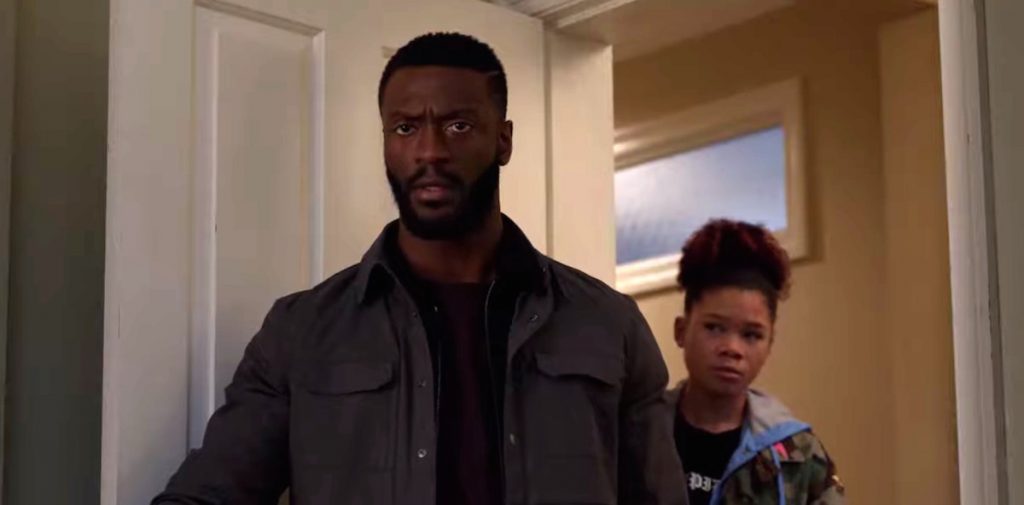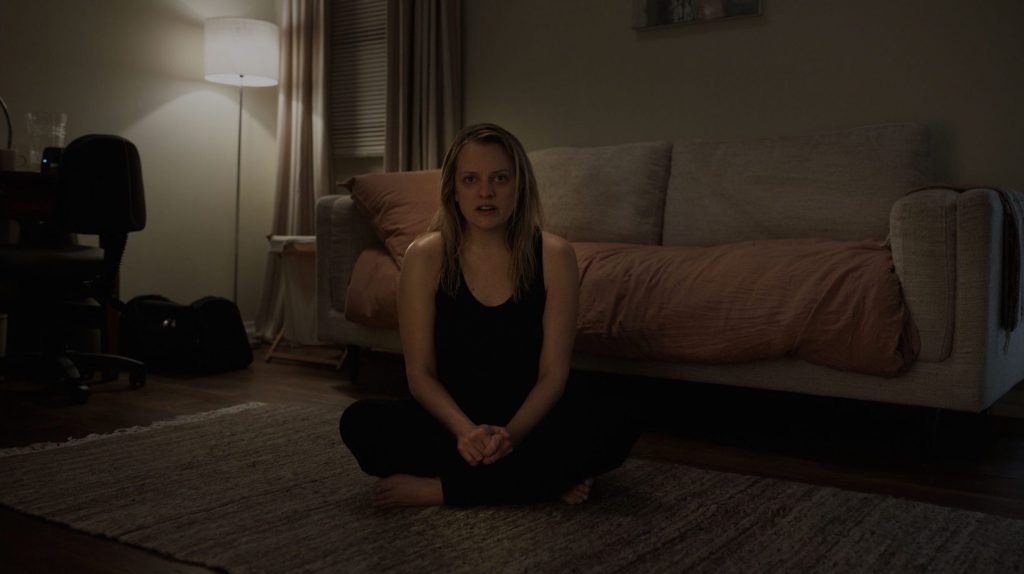Staring Directly At THE INVISIBLE MAN

 The Invisible Man (2020)
The Invisible Man (2020)
Directed by Leigh Whannell
Screenplay by Leigh Whannell
Based on The Invisible Man by H.G Wells
Produced by Jason Blum and Kylie du Fresne
Rated R, 2 hr 4 min
Let’s be perfectly clear – no pun intended – there are some real problems with Universal’s The Invisible Man. There is a late act plot hole the size of a battleship and at least four hand-of-the-writer moments that range from irritating to bloody egregious.
And yet I am going to recommend it, not only because the things the film gets right far outweigh the things it gets wrong, but because I enjoyed it even as my critic-brain was ticking off its flaws.
The first of the things it gets right is that this is not the version of the story Universal had originally planned to tell as part of its ill-fated Dark Universe. That version would have starred Johnny Depp as the titular villain, and leaving aside his recent legal issues there has been a tendency in his career of late to go a bit… broad in his performances. Here they wisely move the focus from both the original H.G Wells novel’s villain-centered story and whatever they had planned for Depp and instead focus on the Invisible Man’s victim, played by Elisabeth Moss.

This enables writer and director Leigh Whannell (Saw, Upgrade) to craft a film that spends a significant amount of time building characters into believable people with (mostly) believable relationships, instead of focusing on one man’s descent into madness and murder. There’s a place for that kind of story and certainly, it could be compelling as well, but here the horror lies in the effect the Invisible Man has on those around him, and that’s one of the real strengths of the film.
It also allows the filmmakers to do more than just tell the story of a bad person who can’t be seen, and instead add another layer of real-world horror in showing the trauma and terror of surviving an abusive relationship. The film begins with Moss’ Cecilia escaping from Adrian Griffin – a nod to the name of the novel’s villain – with the help of her sister and her friend, and her fear that Griffin will drag her back into his violent and obsessive control. Cecilia is terrified of Adrian finding her and what he might do to her and the people she cares about, and Moss compellingly shows that in every twitch of her face and tight lines of her body’s movement.
Then the news comes that Griffin is dead and while this should set her free, strange things begin to happen around Cecilia, leading her to question the reality of Griffin’s death even as her family and friends begin to question her sanity. In another film – one without the audience’s knowledge of an invisible antagonist – there is a terrifying story about the gaslighting and emotional torture that an extremely wealthy person with no constraints and who will not let someone go can inflict on someone, and to the film’s credit, this is not ignored. But of course, we know that he isn’t dead and that he is invisible, but Cecilia’s realization of what she’s up against is hardly one that her sister and her friends are prepared to share, let alone believe, because why would they? Griffin is dead and people can’t be invisible, can they? That’s… crazy.
To give more details would be to get way too much into spoiler territory, and that’s not why we’re here. What I can tell you is that with one painful exception – one of those hand-of-the-writer ones I mentioned – The Invisible Man gets its characters and the relationships between its characters right in a way that a lot of horror films just simply don’t. Fans of The Handmaid’s Tale know how good an actress Elisabeth Moss is, but here in her first leading role in a feature film, she brings a rawness, vulnerability, and strength that anchors this film even in the moments when the writing isn’t really backing her up. Her fear of Griffin and for her loved ones is viscerally shown in ways small and large through her wonderfully expressive face and impeccable body language, as is her determination to fight back.

Importantly, there are people around Cecilia to support her (and to serve as targets for Griffin’s rage) and here is one of the areas where The Invisible Man really shines. A lot of horror films throw a bunch of characters at you built out of stereotypes – the Nerd, the Jock, the Slutty Girlfriend, etc., ad nauseum – and hope that the screenwriter’s shorthand will hide the fact that they are various flavors of canon fodder awaiting a violent death. Here though, we get Aldis Hodge as Cecilia’s childhood friend James, who – in a fairly shocking and welcome change from the norm – is simply there to be her friend and support her, alongside his daughter Sydney, played by Storm Reid. In other films, there would be some sort of romantic entanglement here implied if nothing else, but here it is a friend helping a friend because he is her friend. It’s a beautiful thing to see because it feels real, and some of my favorite moments are the quiet ones before the nightmare fuel starts, where Cecilia, James, and Sydney are allowed to show that there is friendship, family, and love to be had in this world that doesn’t involve a contrived movie romance.

Not every character fares as well, unfortunately, and one scene in particular is rather stunningly unrealistic considering the circumstances. Another character spends such little time actually on screen that when… ah, but no. Too close to spoilers, I’m afraid. Still, overall this is the rarer breed of horror film that puts connection between characters into the forefront of the story.
Of course, the question that every horror fan wants to know is is it scary? Mileage varies of course, but some extremely clever camera work and expert use of the empty space around people helps build real tension in the first half of the film, and once the violence starts – and the film does not shy away from violence, especially against some surprising targets – it is often quick and brutal. Personally, I find that kind of cinematic violence far more disturbing than something drawn out and theatrical, so I thought it was very effective and sometimes shocking. The second half of the film really leans into the special effects side of the idea of an invisible threat and isn’t always as effective as it thinks it is, especially in an extended scene where the titular villain finds himself up against multiple targets. It works, but it is nowhere as unnerving as it could be.
No film is critic-proof, of course, but one does have to bear in mind that the basic premise is that there is a man who is invisible, and recognize the kind of film this is necessarily going to be from the start. To some degree it has to follow certain rules and The Invisible Man has a certain inevitable predictability to it that some viewers won’t be able to ignore. Still, there is real tension in the fear that an abused woman has that her abuser will find her, and in the questioning of one’s own sanity in the face of the impossible. That The Invisible Man works as well as it does rides squarely on the shoulders of Elisabeth Moss’ compelling performance, that of her co-stars, and Leigh Whannell’s assured direction.
That it only has the flaws it does have might give one hope that Universal’s attempt to bring its classic monsters to a modern audience isn’t quite as dead as the Dark Universe.
![]()




